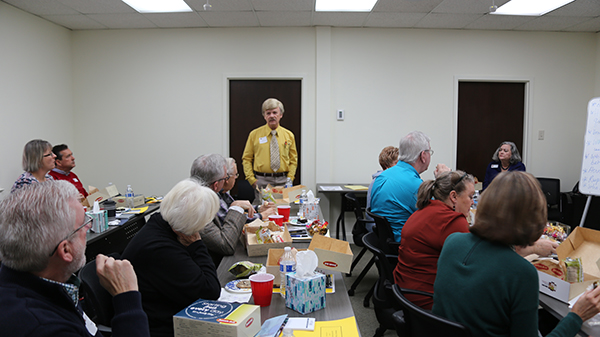The Church has a responsibility to help meet the physical, social and spiritual needs of the growing number of Alabama families living with Alzheimer’s Disease and dementia.
That was the message of a Dec. 4 lunch-and-learn workshop hosted by The Alabama Baptist and led by Miller Piggott, executive director of Alzheimer’s of Central Alabama, and Morris Murray Jr., a minister and biblical counselor based in Jasper.
Attendees from across the state heard how Baptist churches can join in the work already taking place in churches of other denominations regarding ministry to those living with dementia and their caregivers. Murray and Piggott offered rationale for these ministries.
Caring for the sick, which includes those living with dementia, was something Jesus did regularly, Murray said.
“If poor health issues captured the attention of Jesus and His disciples then should that not continue to be true for the Church today?” Murray asked.
Many church members disappear from the pew when chronic health issues develop, Murray said. Outreach requires the “courage to care.”
“We may need to learn how to do things we’ve never done before,” he said. “We may need new understandings of health-related problems, new methods of doing things.”
Alabama has the 5th highest rate of Alzheimer’s Disease in the nation, Piggott said. And while the state’s population is expected to remain the same, the percentage of the population age 65 and older is going to increase. Simply reaching age 65 puts one at greater risk of developing dementia, she said, and now is the time to plan for the future.
“[Science] probably won’t find a cure,” she said. “When you don’t have [a] cure, you have care. How do we provide the kind of care we want for our mothers, fathers, spouses, sisters and in some cases, children? What kind of care do we want for them going forward?”
One way many churches are helping is by offering respite care similar to a mother’s day out model. A respite care program typically runs four hours during which participants are supervised as they engage in activities such as crafts, singing and games.
More programs needed
Most respite programs are church-based, Piggott said, and the movement has grown within the Episcopal and Methodist denominations.
“We are waiting for the Baptists to take this on,” Piggott said. “[Established] programs are eager to pass on what they’re doing to other churches.”
The Golden Rule of caregiving is “you must take care of yourself before you can care for somebody else,” she said, but caregivers often wait until help is absolutely necessary.
“The result is the patient grows more dependent,” Piggott said. “Respite needs to be part of the routine as early as possible to provide comfort and security for the person living with dementia.”
The option of respite care even just one day each week helps caregivers, Piggott said.
Caregivers also need to hear they’re doing well, she said, which is why the care of a church is so needed. Support groups are helpful too because they allow caregivers to share their experiences with others walking the same path. Providing space for support group meetings is another way churches can assist caregivers, Piggott said.
When churches help people living with dementia and their caregivers, they fulfill the gospel, Murray said.
“Christianity is not only individual, it’s also social,” he said. “Once we become believers we become members of the body of Christ. The gospel is social in its orientation and outreach. To know Jesus and to serve Jesus is to serve people.”
Free Bible study resources on a variety of topics, including supporting those with health-related issues, are available through email at morrismurrayjr42@gmail.com. For additional resources go to tabonline.org/dementia-care.
_________________________________________________
Resources for those living with dementia and their caregivers
Statewide
Area Agencies on Aging (AAAs) are local aging programs that provide information and services on a range of assistance for older adults and those who care for them. By contacting your local agency you receive access to critical information including:
- Available services in your area
- Mobility assistance programs, meal plans and housing
- Assistance in gaining access to services
- Individual counseling, support groups and caregiver training
- Respite care
- Supplemental services, on a limited basis.
Go to www.alabamaageline.gov or call 800-AGE-LINE (800-243-5463) for more information.
Regional
Alzheimer’s of Central Alabama (ACA) serves 21 counties across central Alabama but accepts statewide and nationwide calls for information. Contact ACA if:
- You are noticing memory loss in a loved one which is disrupting his or her normal routine.
- You have a loved one who has been recently diagnosed with dementia or Alzheimer’s disease.
- Your loved one has been diagnosed for several years and you need information and guidance.
- You are concerned about a friend or a neighbor.
- You are in need of a break from caregiving.
- You are looking for a support group to attend.
- You want someone to hear your story.
The ACA helpline is available Monday through Friday from 9 a.m. to 4:30 p.m. at 205-871-7970 or toll-free at 866-806-7255. More information is available at www.alzca.org.
- Dothan — Alzheimer’s Resource Center: 334-702-2273, www.wesharethecare.org
- Decatur — Mental Health Association in Morgan County: 256-353-1160, www.mhainmc.net
- Mobile — Alzheimer’s Foundation of the South: 251-209-6766
- Montgomery — Alzheimer’s Education, Resources & Services, Inc. (AERS): 334-233-2139, www.alzheimersers.org
- Florence, Northwest Alabama — Coalition of Alzheimer’s and Related Disorders: 256-740-5431, www.cardnwa.org






Share with others: